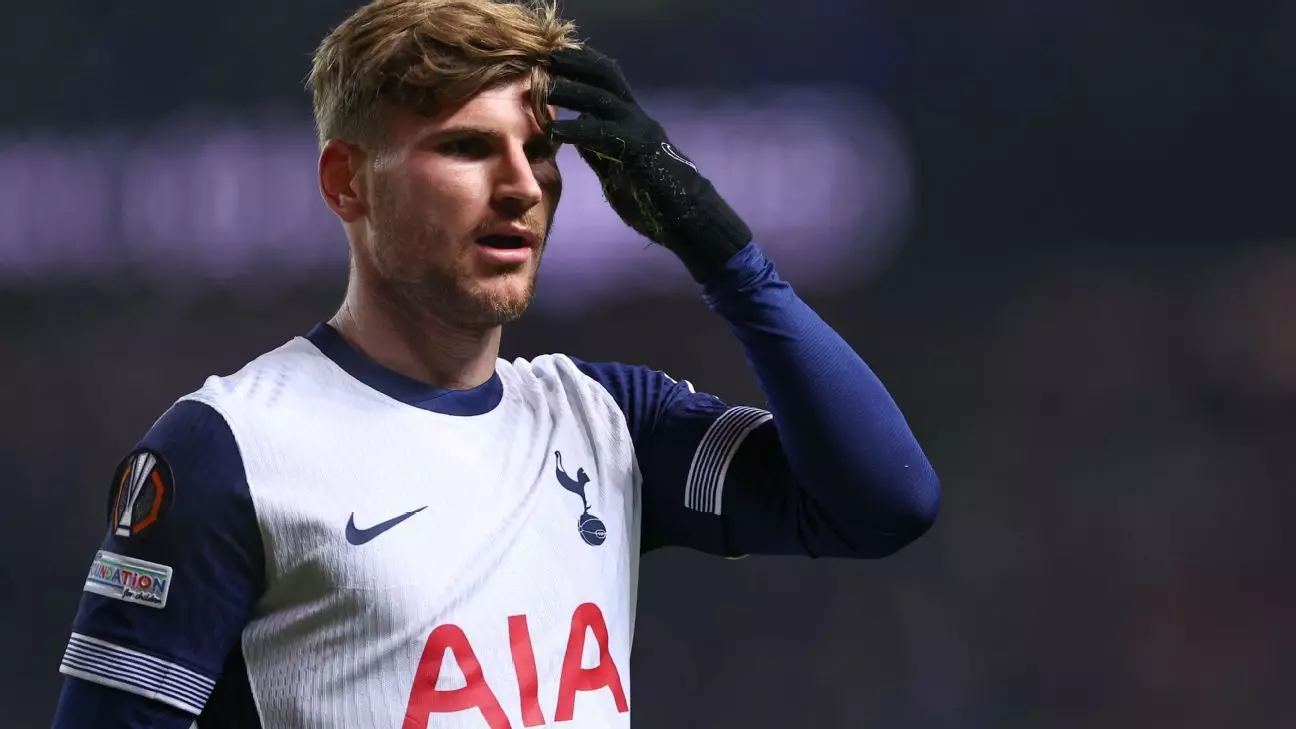Tottenham Hotspur’s recent Europa League match against Rangers was marked by a challenging first half for striker Timo Werner, who ultimately found himself replaced by Dejan Kulusevski. Head coach Ange Postecoglou did not shy away from publicly addressing the disappointing performance from Werner, labeling it as “unacceptable.” In the context of a highly competitive match, where young talents like Archie Gray and Lucas Bergvall stepped up to secure a crucial point for the team, Postecoglou’s comments underscore the urgency and expectations placed upon the senior players in the squad.
Postecoglou’s frank assessment of Werner highlights the broader frustrations within a squad grappling with injuries. His assertion that it is not just criticism but a necessary evaluation brings to light the level of accountability expected from senior international players, particularly in difficult match situations. In times of adversity, having seasoned players who can maintain performance levels becomes crucial, especially when fielding a depleted team.
One of the most compelling narratives from the match was the promising contribution of young players, who managed to salvage a draw despite the challenges faced by the senior squad members. The inclusion of teenagers like Gray and Bergvall signifies not only the potential within the club’s academy but also the essential role they play during moments when experienced players falter. It showcases the precarious balance between reliance on veterans and the necessity to integrate younger talent, especially when injuries sideline regular starters.
Postecoglou’s decision to leverage the capabilities of these youth players illustrates a bold approach that could shape the team’s strategic adjustments moving forward. While older players are expected to guide and mentor their younger counterparts, the performance on the pitch remains a collective responsibility. This can foster an environment where emerging talents feel empowered to take on significant roles, ensuring a strong foundation for the future.
Postecoglou’s repeated insistence on the need for more from his senior players, including Werner, signals a desire for a more unified and resilient team dynamic. During the post-match press conference, he expressed his frustration over the lack of effort, particularly from those with the most experience within the squad. The coach’s remarks suggest that leadership is not solely about being present on the pitch but involves actively contributing performance that matches one’s reputation in the game.
The expectation Postecoglou places on his players reflects the urgency to cultivate a competitive spirit, especially when the team is facing a string of injuries. In moments of crisis, when the stakes are high, leaders must emerge, and the accountability lies heavily on those who are meant to guide their peers. This need for leadership becomes even more vital as Tottenham prepares for subsequent matches against lower-ranked teams, such as their upcoming clash with Southampton.
The concern regarding Tottenham’s away performance this season reveals a deeper issue about the team’s mindset. Postecoglou’s style, characterized as attacking and aggressive, doesn’t inherently make away performances easier, but rather it is a reflection of the intent with which the team approaches each game. This perspective challenges the conventional notion that defending is secondary to attacking; instead, both facets must coexist cohesively.
When asked whether implementing an attacking strategy is more challenging away from home, Postecoglou emphasized the importance of consistent intent. The philosophy of seeking to win rather than merely avoiding defeat is fundamental in cultivating a resilient mindset among players. The coach’s approach indicates a desire to build a reputation where Tottenham can compete, not only within the comforts of their home ground but anywhere they play. Achieving this will be essential as the team navigates through the complexities of the Premier League.
Tottenham occupies an uncomfortable position, ranking 11th in the Premier League and facing considerable pressure to improve their standings. With Southampton lurking at the bottom of the table, the importance of their upcoming match is magnified. A decisive victory would not only provide a much-needed boost in morale but also lay down a marker for the remainder of the season.
The challenge for Postecoglou lies in instilling confidence within his squad while ensuring that every player understands their role and responsibility, particularly in the wake of injuries. Balancing a youthful influx of talent with the demands of senior players is a delicate task, yet it may ultimately define the trajectory of the team as the season progresses.
While the road ahead is fraught with challenges, opportunities abound for Tottenham Hotspur under Postecoglou’s stewardship. Emphasizing resilience, accountability, and a commitment to attacking football will be paramount as they strive for success in both domestic and European competitions.

